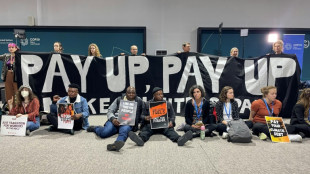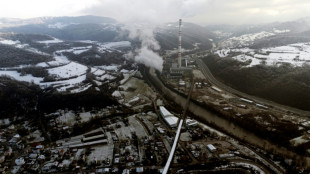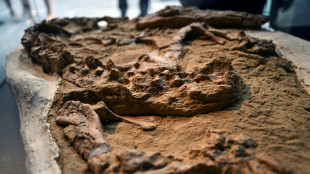
-
 Americans celebrate Thanksgiving after bitter election
Americans celebrate Thanksgiving after bitter election
-
Flood-hit Spain introduces 'climate leave' for workers

-
 UK's Starmer vows to slash net migration
UK's Starmer vows to slash net migration
-
Recount order, TikTok claims throw Romania election into chaos

-
 Jansen stars for South Africa as Sri Lanka crumble to 42 all out
Jansen stars for South Africa as Sri Lanka crumble to 42 all out
-
Bottas set for Mercedes return as Mick Schumacher quits reserve role

-
 Putin threatens Kyiv with new hypersonic missile
Putin threatens Kyiv with new hypersonic missile
-
Georgia delays EU bid until 2028 amid post-election crisis

-
 French PM announces concession in bid to end budget standoff
French PM announces concession in bid to end budget standoff
-
Guardiola's ingenuity will solve Man City crisis, says Slot

-
 South Africa in control after Sri Lanka crash to 42 all out
South Africa in control after Sri Lanka crash to 42 all out
-
'Nothing left': Flood-hit Spanish town struggles one month on

-
 Israel conducts first strike on Lebanon since ceasefire
Israel conducts first strike on Lebanon since ceasefire
-
'Unrecognisable' Mbappe and Real Madrid hurting after European woes

-
 Uber and Bolt unveil women-only service in Paris
Uber and Bolt unveil women-only service in Paris
-
French cognac workers protest China bottling plan amid tariff threat

-
 World tennis No.2 Swiatek accepts one-month doping suspension
World tennis No.2 Swiatek accepts one-month doping suspension
-
Suaalii to start for Wallabies against Ireland

-
 Farrell backs youngster Prendergast at fly-half for Aussie Test
Farrell backs youngster Prendergast at fly-half for Aussie Test
-
Suualii to start for Wallabies against Ireland

-
 Camavinga joins Real Madrid injury list
Camavinga joins Real Madrid injury list
-
Australia passes landmark social media ban for under 16s

-
 Nigerian president woos French investment on state visit
Nigerian president woos French investment on state visit
-
Contentious COP29 deal casts doubt over climate plans

-
 PSG, Real Madrid toil as giants struggle to get to grips with new Champions League
PSG, Real Madrid toil as giants struggle to get to grips with new Champions League
-
Lampard appointed manager of 'ambitious' Coventry

-
 Liberian ex-warlord Prince Johnson dies aged 72
Liberian ex-warlord Prince Johnson dies aged 72
-
K-pop band NewJeans leaves label over 'mistreatment'

-
 Sri Lanka crash to record low Test total of 42 in South Africa
Sri Lanka crash to record low Test total of 42 in South Africa
-
Putin says barrage 'response' to West-supplied missiles

-
 Lebanon MPs seek end to leadership vacuum with January presidency vote
Lebanon MPs seek end to leadership vacuum with January presidency vote
-
Eurozone stocks lift as French political stand-off eases

-
 French farmers wall off public buildings in protest over regulations
French farmers wall off public buildings in protest over regulations
-
France says ready for budget concessions to avert 'storm'

-
 Lampard appointed Coventry manager
Lampard appointed Coventry manager
-
French luxury mogul Arnault defiant at ex-spy chief trial

-
 South Africa bowled out for 191 against Sri Lanka
South Africa bowled out for 191 against Sri Lanka
-
'Europe's best' Liverpool aim to pile pain on Man City

-
 Hezbollah under pressure after war with Israel
Hezbollah under pressure after war with Israel
-
OPEC+ postpones meeting on oil output to December 5

-
 Zelensky slams Russia's 'despicable' use of cluster munitions in energy strikes
Zelensky slams Russia's 'despicable' use of cluster munitions in energy strikes
-
One dead, thousands displaced as floods hit southern Thailand

-
 Lebanon army deploys under Israel-Hezbollah ceasefire
Lebanon army deploys under Israel-Hezbollah ceasefire
-
Imran Khan's wife Bushra Bibi emerges as Pakistan protest figure

-
 COP16 biodiversity talks to restart in February: UN
COP16 biodiversity talks to restart in February: UN
-
Iran to hold nuclear talks with three European powers

-
 French govt ready for budget concessions to avoid financial 'storm'
French govt ready for budget concessions to avoid financial 'storm'
-
Hong Kong airport third runway takes off

-
 In Bosnia, the path to renewables runs through its coal mines
In Bosnia, the path to renewables runs through its coal mines
-
China probes top military official for corruption


France seeks to save Nazi massacre village from decay
A French village preserved as a reminder of Nazi cruelty since Waffen-SS troops murdered 643 people there in 1944 is in danger of decay, sparking efforts to preserve the site.
On June 10, 1944, Oradour-sur-Glane in German-occupied southern France became the scene of a massacre of civilians that still shocks the nation to this day.
Possibly as punishment for the killing by the French Resistance of a high-ranking SS member, German troops rounded up everyone they could find in the village and machine-gunned or burned alive men, women and children, torched or razed buildings and destroyed a church.
Postwar president Charles de Gaulle said the "martyr village" should never be rebuilt, but instead kept as a permanent reminder of the horrors of the Nazi occupation for postwar generations.
- 'Survivors are gone' -
But 80 years later, village buildings are crumbling, roofs have disappeared and walls are covered in moss, prompting local politicians and descendants of villagers to call for a major conservation effort to keep the memory alive.
"All the survivors are gone, the only witnesses of the massacre are these stones," said Agathe Hebras, whose grandfather Robert was the last survivor of only six people to escape the SS murder spree. He died last year.
"I am deeply attached to these ruins, like many people here, we can't let them wither away," the 31-year-old told AFP. "We need to take care of them as best we can for as long as possible."
A new, eponymous town built nearby after the war is bustling, but the old ruins -- which are owned by the French state and a listed heritage site -- are eerily silent.
- 'Urgent action' -
Some of the crumbling, blackened buildings carry signs like "Hairdresser", "Cafe", or "Ironmongery", reminding visitors that people went about their daily lives here until the murderous assault.
Scattered over 10 hectares are the odd rusty bicycle, sewing machine or shell of a period car.
"We need very, very urgent action," said Oradour-sur-Glane's mayor Philippe Lacroix. "As this setting disappears so will remembrance, little by little."
Carine Villedieu Renaud, 47, the granddaughter of the only couple that survived the massacre, often walks across the ruins on her way to the new town, remembering her grandmother who lost her mother, her sisters and her four-year old daughter in the massacre.
"She would take me for walks among the ruins," she said. "We would pick flowers and she would tell me about her old life."
While the grandmother told her stories "without taboo", other survivors only felt able to speak about the massacre decades later, if at all.
Hebras said her grandfather, who lost two sisters and his mother in the killings, only began to talk about the events in the late 1980s.
"The first generation of children born in Oradour after the massacre, which includes my father, lived through a very hard time because their parents kept silent, believing that they needed to forget to keep on living," she said.
- 'Universal significance' -
Since 1946, the government has allocated the equivalent of 200,000 euros ($216,000 at current rates) annually for maintenance, in addition to ad hoc spending, like the 480,000 euros allocated to the village church's restoration last year.
But much more is needed, said Laetitia Morellet, the regional deputy director for heritage and architecture.
"We don't want to bring back what was destroyed," she told AFP. "We want to preserve the state of destruction, because that is what helps people understand this war crime."
Some 19 million euros are needed, and an effort to source the money through donations and state financing is underway.
Oradour-sur-Glane could eventually gain "a certain universal significance" beyond the 1944 massacre and World War II, said Benoit Sadry, president of an association grouping the victims' families.
"What counts is to keep proof that in mass crimes committed during wars it is always the civilian population that pays the highest price," he said.
M.Ouellet--BTB




